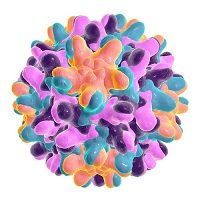Article
Antivirals Work for Hepatitis B Patients
Author(s):
There are few effective treatments for hepatitis B virus infection, but a Korean team says it believes it has found one.

Hepatitis B patients and the physicians who care for them are sorely lacking in treatment options.
Researchers reporting today at the International Liver Congress in Barcelona had encouraging news.
Antiviral therapy for patients in the immune tolerant phase of HBV infection prolongs overall survival and reduces the risk of liver cancer (HCC) and cirrhosis, a Korean team found.
Their study showed that the risks of patients getting HCC and cirrhosis were significantly lowered among patients who got nucleotide analogue (NA) treatment.
Presenting a study by lead author Jeong-Hoon Lee of the Liver Research Institute at Seoul National University, Korea his colleague Young Chang said the team found an 86% lower risk of death in patients at their center who received the NA therapy.
In their study about half the 644 patients were judged to be immune tolerant, a phase where the virus replicates in the liver but is not recognized by the immune system.
Patients can remain in this state with no apparent liver damage for years despite having a high viral load.
The study contrasted outcomes for patients who got no treatment in this symptom-free period to those who got NAs.
They found patients who got the treatment before symptoms of illness arose did better.
The risks of developing HCC and liver cirrhosis were lower in the treatment group and they also survived longer.
Responding to questions after her presentation, Chang said the study had included many patients in the “grey area” where physicians were not certain whether they were truly immune tolerant, but that the important findings were the same—that these symptom-free patients are still sick and will do better with treatment.
2 Commerce Drive
Cranbury, NJ 08512
All rights reserved.




